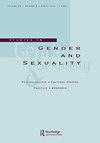A Second Confusion of Tongues: Ferenczi, Laplanche, and the Trauma of Social Life
Q3 Social Sciences
引用次数: 1
Abstract
ABSTRACT In recent years, psychoanalysis has become more aware of, and concerned with, the ways in which social forces affect the development and experience of subjects directly. Yet as a discourse and theory of human development, contemporary psychoanalysis still lacks sufficient accounts for how the social becomes psychological. Freud’s psychoanalysis offers the concept of the superego as a means of explaining how social realities and norms enter and play a part in the psychological life of the subject. But if we were to disengage this useful concept, the superego, from the now problematized notion of the Oedipal as its raison d’être, we are left with an empty construct, and a phenomenon to which new developmental accounts need to be attached. I suggest in this article that psychoanalysis provides us with two major conceptual frameworks up for the task: Ferenczi’s seminal notion of “confusion of tongues,” and Laplanche’s notion of the enigmatic message. Reading Ferenczi closely, I suggest that although he speaks explicitly of one confusion of tongues, his body of work implies two confusions, the second more general and perhaps more profound. I use this reading to expand both Ferenczi and Laplanche beyond their original field of reference, the play of sexuality between adults and children, to the more general question of how our relationships with our parents function as an intimate socialization mechanisms. I argue that as both Ferenczi’s notion of the confusion of tongues and Laplanche’s notion of the enigmatic message are concerned with the enigmatic and potentially traumatic differences and attachments between adults and children, they are well suited to account for how we all become social subjects, that is, the subjects of social power.第二次语言混乱:费伦齐、拉普朗什与社会生活的创伤
近年来,精神分析越来越意识到并关注社会力量如何直接影响主体的发展和体验。然而,作为一种人类发展的话语和理论,当代精神分析仍然缺乏对社会如何变成心理的充分解释。弗洛伊德的精神分析提供了超我的概念,作为解释社会现实和规范如何进入并在主体的心理生活中发挥作用的一种手段。但是,如果我们把这个有用的概念,超我,从现在有问题的俄狄浦斯作为其存在理由être的概念中分离出来,我们就会留下一个空洞的结构,一个需要附加新的发展解释的现象。我在这篇文章中提出,精神分析为我们提供了两个主要的概念框架:费伦齐开创性的“语言混乱”概念,以及拉普朗什关于神秘信息的概念。仔细阅读费伦齐,我认为,尽管他明确地谈到了一种语言混乱,但他的作品暗示了两种混乱,第二种更普遍,也许更深刻。我用这篇阅读来扩展Ferenczi和Laplanche,超越他们最初的参考领域,成人和儿童之间的性游戏,到更普遍的问题,即我们与父母的关系如何作为一种亲密的社会化机制发挥作用。我认为,由于费伦齐关于语言混淆的观点和拉普朗什关于神秘信息的观点都与成人和儿童之间神秘的、潜在的创伤性差异和依恋有关,它们非常适合解释我们是如何成为社会主体的,也就是说,成为社会权力的主体。
本文章由计算机程序翻译,如有差异,请以英文原文为准。
求助全文
约1分钟内获得全文
求助全文
来源期刊

Studies in Gender and Sexuality
Social Sciences-Gender Studies
CiteScore
0.80
自引率
0.00%
发文量
15
期刊介绍:
Beginning in the final two decades of the 20th century, the study of gender and sexuality has been revived from a variety of directions: the traditions of feminist scholarship, postclassical and postmodern psychoanalytic theory, developmental research, and cultural studies have all contributed to renewed fascination with those powerfully formative aspects of subjectivity that fall within the rubric of "gender" and "sexuality." Clinicians, for their part, have returned to gender and sexuality with heightened sensitivity to the role of these constructs in the treatment situation, including the richly variegated ways in which assumptions about gender and sexuality enter into our understandings of "normality" and "pathology."
 求助内容:
求助内容: 应助结果提醒方式:
应助结果提醒方式:


